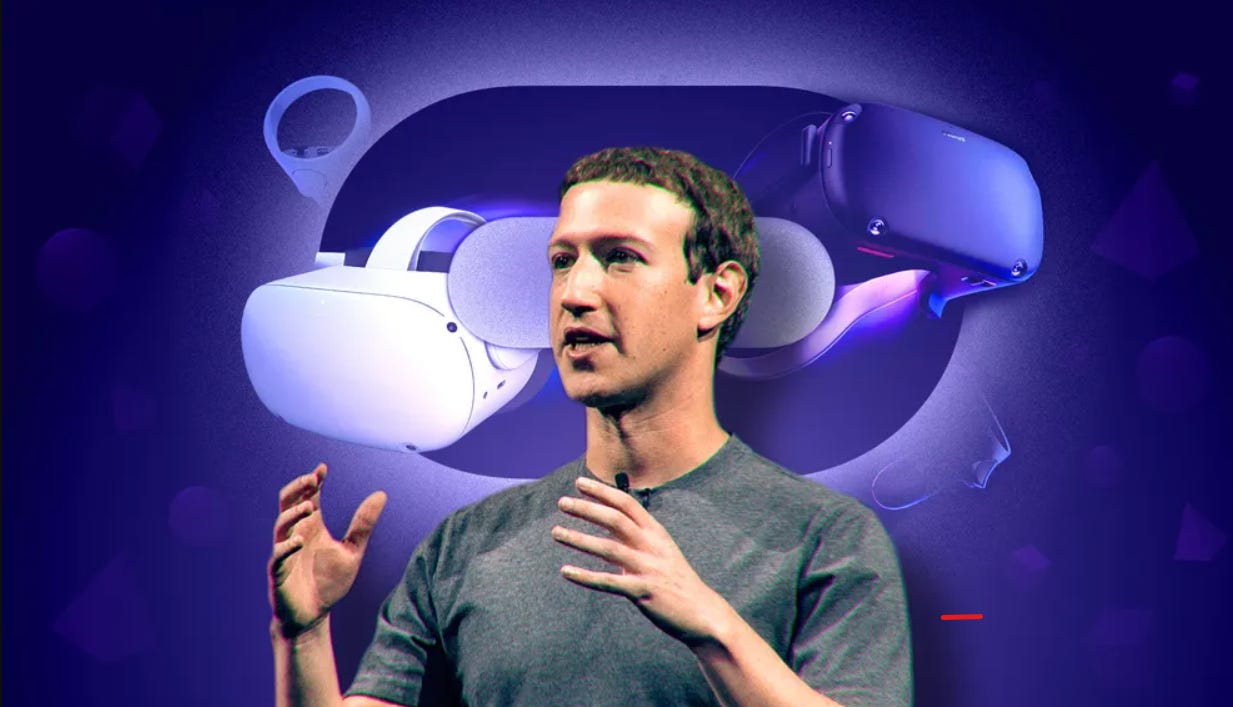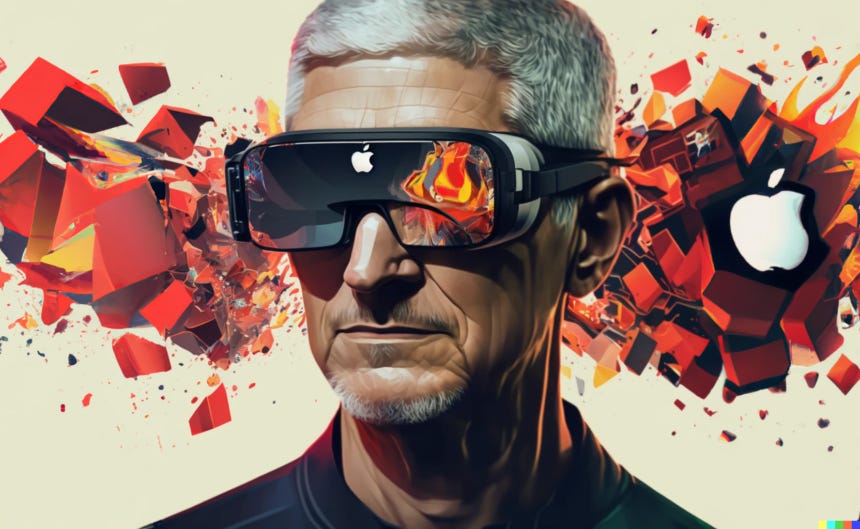Reality Wars -- Apple, Meta, Microsoft
Sports announcers are masterful storytellers. Sure, they help you understand what’s happening in the game… but that’s not the important part. What matters is the storytelling about the game. The stuff that helps you understand the stakes and humanize the teams. They make you care.
One way they do that is with short, dramatic phrases. A favorite of mine is simple: “control your own destiny”. They use that when referring to a team that simply needs to win to put themselves in the playoffs or in the next round. It doesn’t matter what other teams do. If you can execute on this one thing, the rest will take care of itself.
Controlling your own destiny is a great way to frame tech’s reality wars. Companies like Apple, Meta, and Microsoft are all trying to win control of a new computing platform – mixed reality. So this week, I’ll channel my inner sports announcer, humanizing these teams and explaining the stakes of these wars.
To start, let’s understand what it means to be “in control”.
Levels of Control
For today’s story, there are three levels of control worth mentioning.
Low: Application
Medium: Operating system (OS)
High: Hardware
If you make an application, you can be popular and profitable – but you have to play nicely with the OS. You have to tweak your code to work correctly with it, partner with the OS developers on upgrades, and follow its rules. If not, there are many other apps happy to follow those rules and take your users.
If you make an OS, you have a bit more power. You can push the applications around somewhat, but you are still beholden to the device. You have to partner with the device makers and the application makers so that everything runs smoothly, and it requires a lot more coding work and effort than just building an app. But there’s less competition.
If you make the hardware, you have the highest possible level of control. For the most part, hardware is more capital intensive and time-consuming than the other pieces, so there’s even fewer competitors here. And you while you want to make sure you are attracting strong OS’s and interesting apps, you have the final say on what stays and what goes.
Meet the Armies
Meta
For now, Meta is stuck at the application level. They have 3B users on Facebook globally, 2.4B on WhatsApp, and 2.4B on Instagram. They are popular and profitable. But they recently felt the sting of not being at a higher level of control.
Because most of Meta’s apps have ads, and they have so many eyeballs on their apps, the ad-based revenue model they use has been booming. One way Meta strengthened its approach to serving ads for advertisers was by offering some of the best targeting data and tools. They collected data from the other apps on a user’s phone to understand that user’s preferences and interests, grouped similar users together to form targetable user segments, and unleashed advertisers to serve ads to those segments. But then Apple (which controls the hardware and the OS – more on that later) unveiled app tracking transparency (ATT). I wrote more about it in Apple’s Cyber Pirate Beetles, but ATT was basically an FYI and a button. The FYI said “apps are tracking everything you’re doing”, and the button said “click here to stop them”. When 85% clicked that button, Meta was cut off from the extra data that made its ads so good. It estimated that in 2022 it lost ~$13B in revenue because of the change.
So when it comes to mixed reality, Meta and CEO Mark Zuckerberg are doing everything they can to climb to the OS and/or the hardware level. And by doing everything, I mean everything. He changed the name of the company, fired teams from the legacy business while hiring teams to launch the new one, and started expensing ~$12B per year into mixed reality R&D.
Meta has been working on an OS for XR since 2017. Their first iteration – conveniently named XROS – had a team of 300+ but was abandoned without much explanation in 2022. While they might not control the OS of the device itself, they do control a decent substitute – the app marketplace. Just like any app store, there are free and paid items in Meta Quest Store. Meta says they’re continuing to work on their own OS. In the meantime, they’re in the lead on devices. According to Statista, Meta’s VR headsets have ~75% market share.
Microsoft
Historically, Microsoft has been known for its OS (Windows) and its Applications (Office, Teams, etc.). Like any good reality war combatant, they are trying to go up a level and gain a foothold in hardware. As I mentioned briefly in AR Without Borders, that foray into hardware has been a roller coaster ride so far:
AR still needs to earn credibility with real world use cases and wider adoption, but the US Army is interested. And by interested, I mean they signed a 10-year, $22B contract to buy Hololens glasses from Microsoft.
That deal got signed in 2021. But just over a year later, the Army announced that the headsets were making soldiers sick, and they didn’t seem comfortable seeing the contract through.
In the meantime, Microsoft has been proactive in building apps, hoping to at least retain that level of power. They bought a VR company in 2017 and had to shut it down, but then they launched a new application in March 2023 called Microsoft Mesh. Here’s a blurb from my Not So Fast metaverse article:
Mesh introduces options for VR meetings and 3D avatars that will connect to Office applications like Microsoft Teams. Honestly, Mesh seems much more strategically aligned with Microsoft’s position as a business and productivity juggernaut.
Apple
Last to the mixed reality party, but certainly not least, is Apple. Although iTunes and other apps have had some bright moments, Apple is primarily known for its hardware and OS. They are well aware of how awesome having both has been for them (in PCs and phones), so they are trying to have both in mixed reality too.
As we’ve all been excitedly anticipating, they announced their mixed reality headset (with its own OS), the Apple Vision Pro, on Monday. It won’t be available publicly until next year, and it costs a buttload ($3500), but early reviews are bullish. This from a TechCrunch review:
I’ve used essentially every major VR headset and AR device since 2013’s Oculus DK1 right up through the latest generations of Quest and Vive headsets. I’ve tried all of the experiences and stabs at making fetch happen when it comes to XR… But none of them had the advantages that Apple brings to the table with Apple Vision Pro. Namely, 5,000 patents filed over the past few years and an enormous base of talent and capital to work with. Every bit of this thing shows Apple-level ambition. I don’t know whether it will be the “next computing mode,” but you can see the conviction behind each of the choices made here. No corners cut. Full-tilt engineering on display.
I haven’t seen them pushing any particular applications yet (though I’m sure the Vision Pro will come with a few new basic Apple apps)… but I doubt Apple needs any particular app to be a winner.
Recommendations and Wrap-Up
Meta
Meta seems to have a decent start on tapping some hardware power in this new paradigm. Since Apple is officially joining the party, I think the best move Meta can make is to be the Samsung-phone-equivalent to Apple’s device. Zuckerberg can put pressure on Apple by pushing dazzling new features and hardware more frequently – at lower prices – while Apple follows its typical slower cadence. If they really have learned their lesson, Meta should abandon any effort to have the first killer app. Instead, they should dedicate all their time in the foreseeable future to developing a great OS. Android’s OS – the one currently running on their VR devices – allows sideloading, so users can get apps from anywhere. This means they can skirt around Meta’s Quest Store.
Microsoft
Microsoft probably doesn’t need to be a huge winner in mixed reality given how well they’ve ridden the AI wave. If I’m being honest, they might be relegated to apps only, depending on if/how they salvage the US Army contract. But that’s fine. If their devices struggle, they have apps like Mesh, which are a natural fit and potential extension of their professional/productivity brand. I could easily see Microsoft cornering the VR meeting market right from the start.
Apple
Apple will try to run the same playbook they did with the iPhone, starting high-end and working their way down, and I think that makes sense. But maybe they need to get to affordable models more quickly since Meta is already in with huge market share. $3500 does feel pretty steep. At the same time, even if it’s the most beautiful headset so far, that doesn’t mean it’s an attractive thing for people to wear around all the time. Apple should do everything they can to slim down the profile (and eventually ditch the external battery).
Bonus Bullets
Quote of the Week:
“It’s a beautiful object. The real thing of course that it does is enable you to see, hear, and interact with digital content right in your physical space — as if it’s there. That’s spatial computing. And it is a BIG idea.”
— Tim Cook, Apple CEO, on the Apple Vision Pro
Quick News Reactions:
Coinbase sued by SEC — The ‘kicking crypto while it’s down’ continues. The Binance suit is similar but more damning. Look for Coinbase to fight back hard.
CNN CEO fired — The news business is starting to look like Game of Thrones.
Messi to Inter Miami? — Apple is doing what Netflix should be doing! Partnerships that bridge content/storytelling to real world events.





